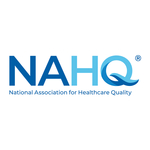National Association for Healthcare Quality Releases New Research on Value of Utilizing Improvement Methodologies for Healthcare Crisis Management

As leaders look to the future, further embedding quality improvement approaches in everyday systems and processes is the first step to addressing healthcare’s biggest challenges
CHICAGO–(BUSINESS WIRE)–#HealthcareQuality–The National Association for Healthcare Quality (NAHQ), the only organization dedicated to healthcare quality professionals, today released new research about how performance and process improvement (PPI) techniques were deployed rapidly and efficiently to support the response to COVID-19. The article, titled “Utilization of Improvement Methodologies by Healthcare Quality Professionals During the COVID-19 Pandemic,” shows how the pandemic demonstrated that quality improvement tools are extremely valuable for quickly finding solutions to hard problems, and are the key to making systems and processes more sustainable moving forward.
The study has important implications for healthcare leaders: As we enter a new normal, healthcare organizations have the unique opportunity to reset their approaches to PPI and quality management – to shift perception of quality improvement from a “nice to have” to a “must-have.” Leaders must now focus on reinvigorating improvement initiatives to regain lost ground in the decades-long journey to improve patient safety, and start solving for healthcare’s biggest challenges including workforce safety, equity, pressing clinical and behavioral health issues, and more.
Published in the Journal for Healthcare Quality, this peer-reviewed research analyzes anonymous survey data collected from members of the NAHQ professional community about the ways in which PPI methods were utilized to combat the COVID-19 crisis, and the supportive conditions that empowered healthcare quality professionals to facilitate positive change. PPI involves employing project management and change management methods to support operational and clinical quality initiatives. It is one of eight domains included in the Healthcare Quality Competency Framework, developed by NAHQ to help healthcare quality professionals reduce variability in care delivery and drive value through improved outcomes.
During the response to COVID-19, most survey respondents utilized PPI methodologies to measure what was happening (83%), rapidly review processes and practices (81%), and decide where to focus their efforts (81%). When asked about the enabling factors that benefitted their improvement work during the pandemic, respondents cited inclusive and compassionate leadership (76%), clarity of organizational priorities (73%), and well-established improvement skills and approaches in their organizations before the pandemic (68%). Looking to the future, respondents identified two key areas to be prioritized: embedding systematic approaches to improvement within healthcare organizations (59%) and working in a more integrated way across teams (48%).
Lucie Pesch, an author of the research article and director of business intelligence for NAHQ, said, “The skillsets of healthcare quality professionals were highly valuable in orchestrating a broad range of initiatives to help manage the pandemic crisis, but as a consequence much of the routine quality improvement work was put on hold. This research highlights lessons that can be learned from the pandemic experience to increase system sustainability in the face of future challenges.”
“Post-pandemic, many organizations are realizing it’s time to re-start PPI efforts in areas where progress has fallen off. These include falls, CAUTIs, CLABSIs and more,” said Stephanie Mercado, CEO and executive director of NAHQ. “As they do that, they are realizing that going back to ‘normal’ is no longer the goal because ‘normal’ was not good enough. A renewed focus on quality and lived experience with quality tools being deployed in rapid fashion during the pandemic proves we can do big things fast and make a meaningful difference in the lives of patients – and make the workforce’s jobs more rewarding.”
About NAHQ
The National Association for Healthcare Quality® (NAHQ) is the only organization dedicated to healthcare quality professionals, defining the standard of excellence for the profession, and equipping professionals and organizations across the continuum of healthcare to meet these standards. NAHQ believes that to reduce variability in healthcare delivery, we must first reduce variability in healthcare quality competencies, so we focus our efforts on healthcare quality competencies and workforce development. NAHQ published the first and only Healthcare Quality Competency Framework and validated it twice in the market. We offer the only accredited certification in healthcare quality, the Certified Professional in Healthcare Quality® (CPHQ), extensive educational programming, networking opportunities and career resources to help healthcare quality professionals enhance their competencies and their value. Learn more at NAHQ.org.
Utilization Study Methodology
This study duplicates prior research conducted in the fall and winter of 2020 by the Q Community, a professional membership organization for healthcare professionals doing improvement work in the United Kingdom and Ireland. The authors of the Q Community study provided the survey questionnaire to the National Association for Healthcare Quality (NAHQ) and granted permission for NAHQ to use and adapt the questions as needed to suit an audience of healthcare quality professionals based in the United States. This study was evaluated by an Institutional Review Board and determined to meet the requirements for exempt Human Subjects Research (Protocol # IRB-300007601). The researchers collected 234 total analyzable, anonymous responses from NAHQ members and subscribers between September 2nd and September 16th, 2021. The survey included questions related to improvement work during the COVID-19 pandemic, including references to specific tools and resources used as well as questions related to respondents’ professional roles and responsibilities. Minimal adaptations were made to the original survey used in the Q community study.
Contacts
Media Contact:
Amanda Belknap
Abelknap@nahq.org
Director of Marketing
